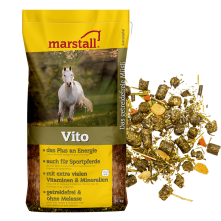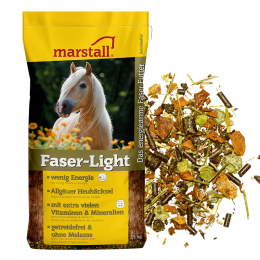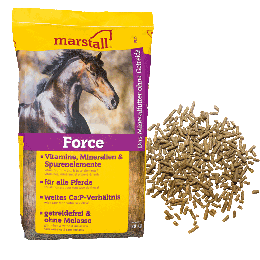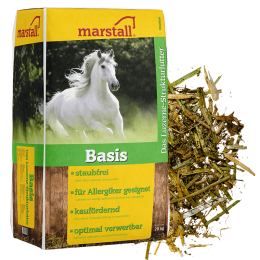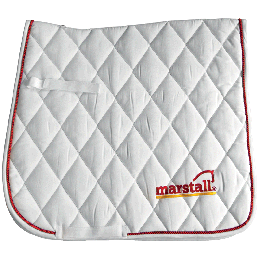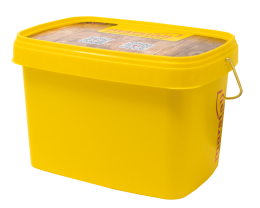Vito
- added energy
- also suitable for sports horses
- with high levels of vitamins & minerals
- cereal-free & molasses-free
marstall Vito is the cereal-free muesli for all horses with feedrelated metabolic problems. This reduced starch and sugar blend contains no molasses and is rich in crude fibre, oils, vitamin E, zinc and selenium.
marstall Vito is ideal for all leisure and sports horses - even those requiring a cereal-free diet
If a horse is diagnosed with a metabolic disorder such as polysaccharide storage myopathy (PSSM), equine metabolic syndrome (EMS) or Cushing’s disease, this no longer means the end of its career as a riding or driving horse. With an appropriate care, exercise and feeding plan, even horses with metabolic disorders and their owners can still live life to the full.
Our marstall Vito is based on hay fibre and contains no cereals or molasses. As a low sugar and starch muesli, Vito is the ideal feed for horses with metabolic disorders, an intolerance to sugar and starch, or those with a tendency towards diet-related laminitis. marstall Vito contains high levels of zinc, vitamin E and antiinflammatory omega-3 fatty acids, corresponding to scientific recommendations. Its high oil content means that marstall Vito can also
provide sports horses with large amounts of cereal-free energy while still being gentle on the stomach. Our marstall Vito is rounded off with delicious natural ingredients such as carrot and garlic flakes.
For horses with dental problems or which rush their food, we recommend feeding marstall Vito soaked with around one litre of water per litre of marstall Vito.
Feed supplement for horses
Composition of marstall Vito
Grass, dried at high temperature (82.00 %), rapeseed oil, refined, (5.00 %), alfalfa, dried at high temperatures (4.00 %), carrot flakes (3.00 %), grape marc, dried (1.20 %), sodium chloride (0.90 %), calcium carbonate (0.70 %), garlic flakes (0.50 %), linseed (0.50 %), monocalcium phosphate (0.50 %), magnesium oxide (0.35 %), brewer‘s yeast (0.25 %)
EADCM conform acc. FEI
Nutritional analysis and energy per kg
| Crude protein | 11.50 % |
| pcd* crude protein | 58.00 g |
| Crude fat | 7.50 % |
| Crude fibre | 19.00 % |
| Crude ash | 12.00 % |
| Energy (DE)** | 10.50 MJ |
| Energy (ME)** | 9.00 MJ |
| Calcium | 0.90 % |
| Phosphorus | 0.40 % |
| Sodium | 0.50 % |
| Magnesium | 0.35 % |
| Starch | 2.50 % |
| Sugar | 7.50 % |
*precaecal digestibility = can be digested in the small intestine = available
**acc. to GfE 2014 (Society for Energy Efficiency)
Nutritional additives per kg
Fat-soluble vitamins
| Vitamin A | 13,500.00 I.E. |
| Vitamin D3 | 1,000.00 I.E. |
| Vitamin E | 720.00 mg |
| Vitamin K3 | 4.50 mg |
Water-soluble vitamins
| Vitamin C | 90.00 mg |
| Vitamin B1 | 30.00 mg |
| Vitamin B2 | 12.00 mg |
| Vitamin B6/Pyridoxine Hydrochloride | 30.00 mg |
| Vitamin B12/Cyanocobalamin | 120.00 mcg |
| Biotin | 1,200.00 mcg |
| Folic acid | 10.00 mg |
| Choline chloride | 270.00 mg |
| Calcium D-pantothenate | 35.00 mg |
| Niacin | 25.00 mg |
Trace elements
| Iron as monohydrate iron (II) sulphate | 170.00 mg |
| Copper as copper (II) sulphate pentahydrate | 55.00 mg |
| Zinc as zinc oxide | 300.00 mg |
| Manganese as manganese (II) oxide | 125.00 mg |
| Iodine as anhydrous calcium iodate | 1.00 mg |
| Selenium as sodium selenite | 0.95 mg |
Feeding recommendations
... as a single concentrated feed
| Small horse/pony | approx. 250 g per 100 kg body weight/day |
| Thoroughbred | approx. 300 g per 100 kg body weight/day |
| Warmblood | approx. 350 g per 100 kg body weight/day |
Example feed per day for a 550 kg horse as a single concentrated feed in addition to hay
| No work/Light work | approx. 1.0 to 2.0 kg |
| Moderate work | approx. 2.0 to 3.0 kg |
We recommend feeding Vito soaked (pour approx. 1 litre of water over 1 litre of Vito and leave to absorb for 15 to 20 minutes). This is especially important for horses which rush their food, those which are jealous at feed time or those with dental problems, poor digestion, etc.
1 litre of marstall Vito = approx. 540 grams
Feeding advice
All specified feed quantities are to be given throughout the day in several small feeds. Our recommendations assume a roughage intake (hay) of 1.5 kg per 100 kg body weight per day.
